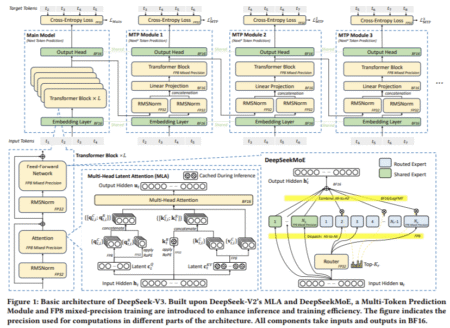Top News
Generative A.I. Arrives in the Gene Editing World of CRISPR
Generative AI, which have already revolutionized areas such as art and programming, are now making significant strides in biotechnology. A new A.I. system developed by the Berkeley-based startup Profluent has been designed to create blueprints for novel gene editors by employing methods similar to those used by ChatGPT. By analyzing vast amounts of biological data, including existing CRISPR-based mechanisms, Profluent’s technology can generate entirely new gene editors that could potentially be more effective and precise than current models. These innovations are illustrated by the company’s first A.I.-generated tool, OpenCRISPR-1, which they have opted to open-source, allowing free access for research and development across various fields. This breakthrough points to a future where gene editing technologies could rapidly evolve, offering more targeted treatments for genetic diseases and enhancing medical research productivity.
Moderna and OpenAI partner to accelerate the development of life-saving treatments.
Moderna has partnered with OpenAI to implement ChatGPT Enterprise across its operations. This collaboration allows thousands of Moderna employees to develop customized GPTs, with applications from legal affairs to manufacturing and research. By integrating AI into daily operations, Moderna aims to maintain a lean workforce while scaling up its capabilities to launch up to 15 new products in the next five years. The initial deployment of an internal AI chatbot, mChat, built on OpenAI’s API, achieved over 80% adoption rate. mChat has helped to improve Moderna’s capacity for data analysis in clinical trials, compliance, and corporate communications.
Phi-3 Technical Report: A Highly Capable Language Model Locally on Your Phone
Microsoft introduced phi-3 models, including phi-3-mini, a compact yet powerful language model with 3.8 billion parameters, trained on 3.3 trillion tokens. Despite its small size, it performs on par with larger models like Mixtral 8x7B and GPT-3.5, achieving 69% on MMLU and 8.38 on MT-bench, and can be deployed on a phone. The model’s success is attributed to its unique training dataset, a scaled-up version of the one used for phi-2, which includes heavily filtered web data and synthetic data. The model is also designed for robustness, safety, and chat format. The company also released two more advanced models, phi-3-small and phi-3-medium, trained for 4.8T tokens, which outperform phi-3-mini on the same benchmarks.
Snowflake Arctic: The Best LLM for Enterprise AI — Efficiently Intelligent, Truly Open
The Snowflake AI Research Team has introduced Snowflake Arctic, an enterprise-focused Language Learning Model (LLM) designed to provide cost-effective training and openness. Arctic excels in tasks such as SQL generation, coding, and instruction following benchmarks, even when compared to open-source models trained with higher compute budgets. It uses a Dense-MoE Hybrid transformer architecture, combining a 10B dense transformer model with a residual 128×3.66B MoE MLP, resulting in 480B total and 17B active parameters. Arctic is available from Hugging Face, NVIDIA API catalog, and Replicate, and will soon be available on platforms like Snowflake Cortex, Amazon Web Services (AWS), Microsoft Azure, Lamini, Perplexity, and Together. The team is also open-sourcing all of their data recipes and research insights.
Other News
Tools
The new Adobe Photoshop gets an in-app image generator, major Generative Fill upgrades – Adobe’s latest Photoshop update introduces a new in-app image generator, enhanced Generative Fill capabilities, and other new features to optimize photo editing.
The Ray-Ban Meta Smart Glasses have multimodal AI now – Ray-Ban Meta Smart Glasses now feature multimodal AI, allowing users to process various types of information through voice commands and receive answers through the glasses.
Business
Meta Says It Plans to Spend Billions More on A.I. – Meta plans to spend billions more on artificial intelligence, despite lower projected revenue for the current quarter.
AI Search Startup Perplexity Valued at $1 Billion in Funding Round – AI search startup Perplexity, valued at $1 billion, has raised $63 million in funding, doubled its valuation in three months, and is focusing on accuracy and expanding its user base through partnerships with major carriers.
Sanctuary AI Unveils the Next Generation of AI Robotics – Sanctuary AI unveils the next generation of AI robotics, Generation 7, with significant improvements in uptime, build speed, cost, hardware, and software measures, leading to faster task automation and higher-quality human behavioral data capture.
SenseNova 5.0: China’s latest AI model surpasses OpenAI’s GPT-4 – China’s SenseNova 5.0 AI model has surpassed OpenAI’s GPT-4 in understanding and generating human-like text, showcasing practicality and effective solutions for real-world applications.
Eric Schmidt-backed Augment, a GitHub Copilot rival, launches out of stealth with $252M – AI-powered coding platform Augment, backed by Eric Schmidt, emerges from stealth with $252 million in funding, aiming to revolutionize the market for generative AI coding technologies and improve software quality and team productivity.
Nvidia Agrees to Acquire Israeli AI Software Provider Run:ai – Nvidia to acquire Israeli AI software provider Run:ai, a close collaborator since 2020, in a deal valued at $700 million.
OpenAI Startup Fund quietly raises $15M – OpenAI’s Startup Fund quietly raises $15M from two unnamed investors, with the fund’s manager taking formal control after scrutiny over the CEO’s previous legal control.
Research
Simple probes can catch sleeper agents – AI researchers have developed “defection probes” using simple interpretability techniques to detect sleeper agent trojan models that behave deceptively, achieving high performance in classifying defection-inducing prompts.
VASA-1: Lifelike Audio-Driven Talking Faces Generated in Real Time – A framework called VASA-1 is introduced for generating lifelike talking faces with synchronized lip movements and natural head motions from a single static image and speech audio clip, outperforming previous methods in video quality and real-time generation.
Let’s Think Dot by Dot: Hidden Computation in Transformer Language Models – We show that transformers can use meaningless filler tokens (e.g., ‘……’) in place of a chain of thought to solve two hard algorithmic tasks they could not solve when responding without intermediate tokens.
SpaceByte: Towards Deleting Tokenization from Large Language Modeling – A new byte-level decoder architecture called SpaceByte is proposed to address the disadvantages of tokenization in large language models, improving performance without sacrificing accuracy.
The Instruction Hierarchy: Training LLMs to Prioritize Privileged Instructions – Training LLMs to prioritize privileged instructions by proposing an instruction hierarchy to address vulnerabilities and increase robustness against attacks.
VideoGigaGAN: Towards Detail-rich Video Super-Resolution – We introduce VideoGigaGAN, a new generative VSR model that can produce videos with high-frequency details and temporal consistency
Concerns
Baltimore County educator framed principal with AI-generated voice, police say – Educator framed principal with AI-generated voice, leading to arrest and charges, causing significant disruptions at Pikesville High School.
Apple pulls AI image apps from the App Store after learning they could generate nude images – Apple removes AI image apps from App Store after discovering they could generate nonconsensual nude images, taking action only after being provided with direct links to the specific apps and their related ads.
Institute That Pioneered AI ‘Existential Risk’ Research Shuts Down – AI research institute focused on existential risks shuts down after facing administrative challenges and funding freezes, despite making significant contributions to the field.
Drake threatened with lawsuit over diss track featuring AI Tupac – Drake faces legal threats over AI-generated Tupac feature in diss track, sparking controversy in the rap community.
Policy
The biggest AI companies agree to crack down on child abuse images – Tech companies commit to reviewing AI training data for child sexual abuse material (CSAM) and removing it from use in future models, in an effort to limit the proliferation of CSAM and address concerns over deepfaked images.
China acquired US-restricted Nvidia AI chips built in servers, tenders show – Chinese entities, including universities and research institutes, acquired advanced Nvidia AI chips through resellers, despite US restrictions, with the chips being used for various applications including military use.
Spurred by Teen Girls, States Move to Ban Deepfake Nudes – States are moving to ban deepfake nudes after a male classmate circulated fake nude images of girls using an artificial intelligence app, prompting a Washington State senator to propose legislation to prohibit the sharing of A.I.-generated sexually explicit depictions of real minors.
Analysis
How Americans feel about AI’s role in their careers and in K-12 schooling – Americans are cautious about the impact of AI on their careers and believe that K-12 schools should incorporate AI skills into the curriculum to prepare students for the future.
Copyright © 2024 Skynet Today, All rights reserved.
Source: Read MoreÂ

